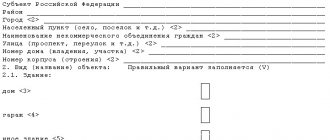Legal nuances of real estate exchange
The rights and obligations of citizens when making real estate exchange transactions are regulated by Article 31 of the Civil Code of the Russian Federation.
Without going into details, according to the law, one owner transfers his property to another, and he, for his part, provides him with his property. Next, all papers are reissued, and mutual settlements are made if necessary.
There are two types of exchange:
- Equal . When the assessed value of both properties is the same;
- Unequal . When the price of one property is less than another.
In an unequal transaction, both parties agree among themselves on the amount of additional payment for the property. The conditions and procedure for the mutual exchange of property are formalized through an agreement, which is certified by a notary. This ensures that all agreements specified in the agreement are respected.
How to change an apartment to a house? Main stages of exchange
The law does not provide for any strict rules and procedures for the exchange of real estate. The parties themselves can agree on the procedure for the transaction; they can conduct it in person or remotely. There are no restrictions on the amount of additional payments in case of an unequal exchange - the parties agree on this themselves (only it is necessary to specify the amount of the additional payment in the contract).
The process of exchanging an apartment for a house includes several stages:
Property valuation
Owners are advised to first obtain an independent appraisal of their property.
To do this, you should contact an appraiser. They can professionally assess the current wear and condition of objects, their location, pros and cons, and surrounding infrastructure. Based on the data obtained, the market value of housing is determined.
What documents will owners need?
To conclude an agreement to exchange an apartment for a house (and vice versa), you need to prepare the following package of documents:
- Documents confirming ownership of real estate: certificate, USRN extract, purchase and sale agreement or inheritance or gift agreement;
- Extracts from the BTI and from the passport office;
- Consent (permission) of the husband/wife to complete the transaction and waiver of claims to the property from other residents;
- Cadastral passport;
- Home Book;
- Passport;
- An extract from the housing office (or homeowners' association, management company, SNT) about the absence of debt for utility services;
- Documents for land ownership, cadastral passport;
- The act of surveying a land plot.
All documents must be provided in originals. Next, copies are made of them and certified by a notary.
Concept
What is an agreement to exchange an apartment for a house with a plot?
In such a transaction, the party that owns the apartment exchanges it for a house with a plot of land on which it is located.
If the participants agree that the exchange is unequal, one of them makes an additional payment to the other in money.
In this transaction, the first participant loses ownership of the apartment (is its seller), and in return acquires ownership of the house and land (is its buyer).
The second loses ownership of a plot of land with a house on it (is their seller), acquires ownership of an apartment (is their buyer) (read about exchanging a house for an apartment).
Agreement for exchanging an apartment for a house with a plot of land sample.
You can learn about how to exchange a room in a dorm or communal apartment, as well as a two-room and three-room apartment, and what documents are required to exchange living space from our articles.
Subtleties of real estate exchange and pitfalls
From a legal point of view, an exchange agreement differs from a purchase and sale agreement. First of all, when exchanging real estate, both participants simultaneously have the status of Seller and Buyer. But that's not all:
- If the price of each object is not specified in the document, then the exchange is considered equal. (be careful - many owners did not take this point into account and fell into a “trap”);
- The housing becomes the property of another owner only if all clauses of the contract are observed, the deed is signed and the state registration of ownership of both objects is completed in Rosreestr (thus the law “insures” the owners against fraudulent schemes - when one buyer has already received the property, but the second has not yet );
- In addition to signing the Act on the execution of the exchange, the parties also need to sign another Act confirming the execution of the counter transaction if the other party wants to transfer the property later (Article 328 of the Civil Code of the Russian Federation);
- If, according to a court decision, the exchange agreement was executed incorrectly, or the exchange was made without the consent of one of the owners, then such a transaction is declared invalid. And the property is returned to its original owners;
- When making an unequal exchange with an additional payment (which happens quite often when deciding to exchange an apartment for a house), the owner of the house is required to pay income tax of 13% on the profit received. In case of an equivalent exchange, there is no need to pay tax;
- As already mentioned, when the rights to private houses are transferred, the rights to the land plot are automatically transferred. Here it is important for the apartment owner, even before signing the exchange agreement, to check whether the previous owner has violated the laws on the development of plots (according to its category and purpose). Otherwise, there is a risk of losing invested funds and land.
Transaction costs
Unlike ordinary purchase and sale transactions, during real estate exchange transactions, owners incur additional costs:
- If the area of one or both objects is more than 100 square meters. m, then a state duty is charged - 0.5% of the cost of a more expensive object;
- If the object is changed twice in a year, the amount of the duty becomes even higher - and you need to pay up to 2.5% of the cost;
- If the housing area is less than 100 sq. m., and this is the first housing exchange transaction of the year, then you do not need to pay a fee;
- Expenses for notary services;
- Income tax (if the transaction is unequal) - in the amount of 13% of the profit.
All costs of paying fees and notary services are borne by both participants in the process.
Agreement for exchanging an apartment for a house (sample)
AGREEMENT for the exchange of residential buildings with adjacent land plots (additional payment of the difference in the value of houses before registering the exchange; option: encumbering residential buildings with a mortgage, lease, etc.) ______________ (place and date of conclusion of the agreement in words)
Citizen (citizen) of the Russian Federation _______________ (passport: series ____, N ____, issued ________________, date of birth __________, place of birth _______________, not married/married to __________________________), hereinafter referred to as __ “Party-1”, and citizen ( citizen) of the Russian Federation _______________ (passport: series ____, N ____, issued by ________________, date of birth __________, place of birth _______________, not married/married to _________________________________), hereinafter referred to as__ “Party-2”, hereinafter referred to as “Parties” ", have entered into this agreement as follows;
- SUBJECT OF THE AGREEMENT
1.1. Party-1 and Party-2 of this agreement exchanged residential buildings owned by them with adjacent land plots on which they are located (hereinafter referred to as “residential buildings” and “land plots”, respectively). Residential building-1 with the adjacent plot is transferred to the ownership of Party-2. Residential building-2 with the adjacent plot is transferred to the ownership of Party-1.
1.2. Residential building 1, owned by Party-1, is located at the address: _______________, consists of a _____-storey (brick, log, etc.) building with a total area of _____ square meters. m, including living area - _____ sq. m, with economic and domestic buildings and structures: ______________ (name and size (sq. m) of buildings), cadastral number ___________________, located on a fenced plot of land measuring ______ sq. m. m, which is confirmed by ________, issued___ _________ dated “__”_________ ____ N _____, and belongs to her on the basis of ________________ dated “__”_______ ____ N ___, which is confirmed by the Certificate of State Registration of Property Rights N _____, issued by “__ »________ ____ city. The cost of the specified residential building-1 is _____ (_________) rubles according to the certificate _______________ (specify the issuing governing body or organization) dated “__”________ ____ for N _____. Residential building-1 with an adjacent plot is valued, by agreement of the Parties, at _____ (____________) rubles. Residential building-1 is supplied with: electricity, water supply, sewerage, hot water, central heating, gas, telephone, cable TV, Internet, ___________. Maintenance of residential building-1 is carried out by: the owner (management organization, _______________ (select an option or add)). Services for ____________ (security, cleaning, garbage removal, etc.) are provided by __________ on the basis of ______ ____ from “__”_________ ____ city N ____. Residential building-1 is equipped with ____________________. The equipment and communications of the residential building-1 have been checked by the Parties and are in good condition, with the exception of ______________________. Special notes: ________________________________________. Existing legal claims ___________________________.
1.3. Residential building-2 belonging to Party-2 is located at the address: _______________, consists of a _____-storey (brick, log, etc.) building with a total area of _______ sq. m. m, including living area - ________ sq. m, with economic and domestic buildings and structures: _______________ (name and size (sq. m) of buildings), cadastral number ___________________, located on a fenced plot of land measuring _______ sq. m. m, which is confirmed by ________, issued___ __________ dated "__"_________ ____ N ______, and belongs to her on the basis of __________________ dated "__"_______ ____. N ___, which is confirmed by the Certificate of State Registration of Property Rights N _____, issued by “__”________ ____. Purpose of the land plot: __________. Cadastral number ____________. The cost of the specified residential building-2 is _____ (_______) rubles according to the certificate _________________ (specify the issuing governing body or organization) from “__”_________ ____ for N ______. Residential building-2 with the adjacent plot is valued, by agreement of the Parties, at _____ (__________) rubles. Residential building-2 is supplied with: electricity, water supply, sewerage, hot water, central heating, gas, telephone, cable TV, Internet, ___________. Maintenance of residential building-2 is carried out by: the owner (management organization, ________________ (select an option or add)).
How to draw up a contract correctly?
A real estate exchange agreement must be drawn up only in writing. It is important to do this correctly, otherwise the agreement will be invalidated and the deal will be cancelled.
The document must indicate the following points:
- Date and place of the transaction;
- Information about the owners - full name, registration address;
- Information about real estate objects participating in the exchange - location, number of floors, entrance number, number of rooms, infrastructure facilities located nearby, etc.;
- Information confirming the ownership of housing;
- The amount of additional payment that must be made by the owner whose property is cheaper;
- Consequences of breaking the deal;
- Force majeure;
- The preferred method of resolving disputes in case of non-compliance with the terms of the agreement by one of the parties (court, arbitration, out-of-court procedure);
- Personal signatures of the parties;
- Signature of the notary certifying the contract.
After signing the agreement, each party receives two notarized copies of the agreement. One of which is subsequently submitted for registration to Rosreestr.
Additional terms of the agreement
There is no established template for an apartment exchange agreement, however, standard forms contain essential conditions and information about sellers and their responsibilities.
In addition to the mandatory clauses, the contract must contain additional conditions:
- Names of the parties. The surname, first name and patronymic of each party are indicated without abbreviations. Individual sellers can be citizens of the Russian Federation, stateless persons (persons who do not have citizenship as such), and foreigners.
- If one of the parties is a legal entity (and current legislation does not prohibit this), its name and legal address are indicated.
- Passport details of the parties, details.
- Date and place of the transaction.
- Term. This point, although not mandatory, is very important. Theoretically, the parties must enter into property rights at the same time, which is difficult to achieve in practice. If one owner receives documents for an apartment before another, the agreement must have a validity period. If this period has expired, you cannot obtain a certificate of ownership.
- Force majeure circumstances that may affect the transfer of property rights. Signatures of the parties. For legal entities, these are seals and signatures of managers.
The responsibilities and rights are the same for both parties, since each of them acts as both a seller and a buyer in the exchange.
As a general rule, a transaction is concluded in writing .
An oral agreement is possible if the cost of the contract (additional payments in case of exchange) is less than 10 times the minimum wage or if the parties simultaneously enter into rights .
A sample agreement for the exchange of real estate can be found here.
Cases when an exchange transaction may be canceled (not take place)
According to the Civil Code, there are a number of cases when it is impossible to exchange real estate:
- The barter agreement was declared invalid in court;
- One of the owners was sued;
- If a building or living space is considered unsafe, it is demolished;
- If the property has official status or is a dormitory;
- If a participant in the transaction was expelled from the housing cooperative.
If there is at least one of the violations described above, the contract will be declared invalid. And it will be cancelled, and all data in Rosreestr regarding real estate rights will return to the previous owners.
Did you find this article helpful? Please share it on social networks: Don't forget to bookmark the Nedvio website. We talk about construction, renovation, and country real estate in an interesting, useful and understandable way.






